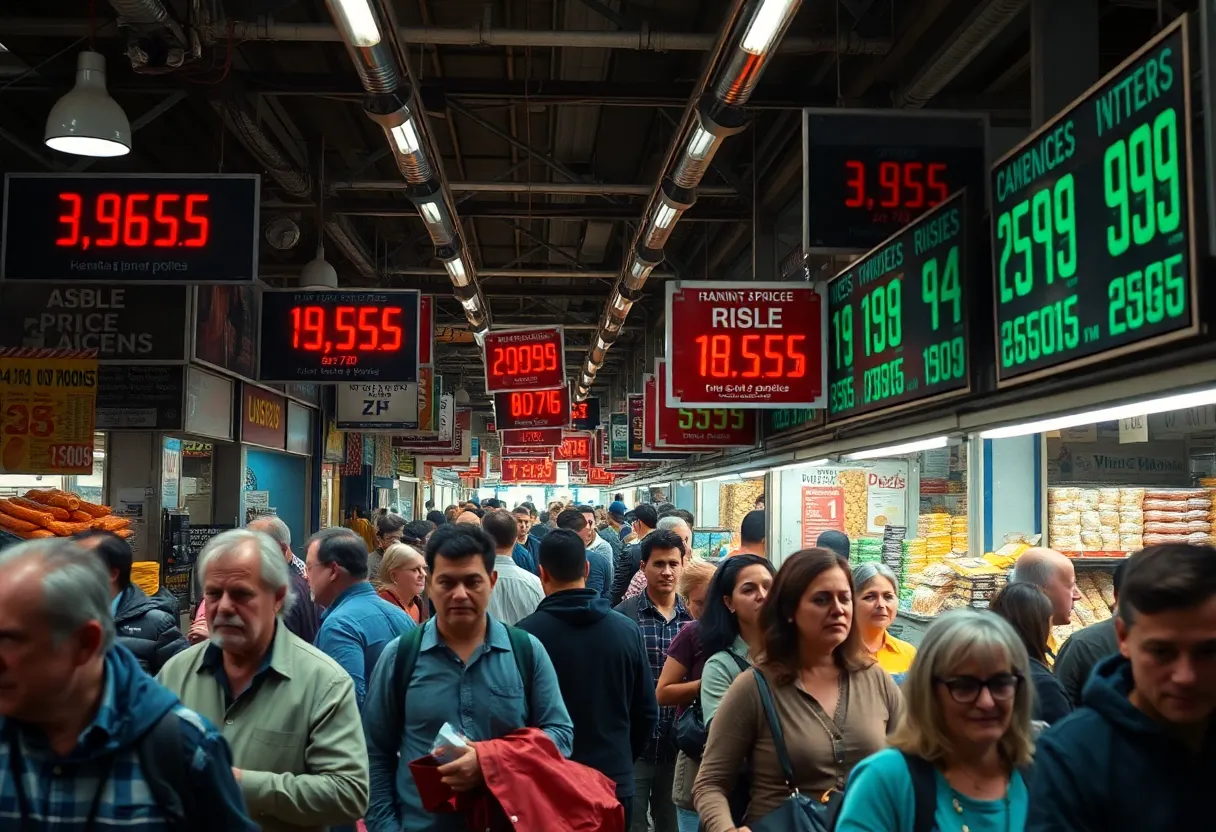

Consumers express worry in a marketplace affected by inflation.
As inflation rises in the U.S., consumer sentiment has taken a significant dip, dropping 10% in February compared to January. Many citizens are concerned about rising prices, with over 62% believing the government is doing insufficiently to manage inflation. Tariffs imposed on imports by the current administration are seen as a major contributing factor. Retail sales have also declined, reflecting growing unease in the market. Economic experts warn that this decline in sentiment could lead to changes in consumer behavior, affecting overall economic growth.
Inflation is on the rise in the U.S., and it’s creating a bit of a stir among consumers. As prices creep upward, many folks are feeling the pinch and looking for answers. Recently, President Donald Trump has pointed the finger at his predecessor, blaming Joe Biden for the inflationary pressures the country is facing.
New data from the University of Michigan indicates that consumer sentiment has taken a nosedive, dropping by 10% in February compared to January. This marks the second consecutive month of decline, which raises some eyebrows and concerns. Many are attributing this drop to fears over rising prices, largely linked to Trump’s tariffs on imports.
Recent polling shows that a significant chunk of the population—about 62% of U.S. adults—believe that Trump’s administration isn’t doing enough to tackle inflation. As we look ahead, people are increasingly worried about price increases, with expectations now sitting at 4.3% for the year. This is the highest inflation expectation recorded since November 2023 and up from 3.2% in January.
Trump’s tariffs on Chinese goods, along with steel and aluminum imports, are shining a light on what many see as a significant factor behind the negative economic sentiment. These taxes could potentially push prices even higher, adding more weight to consumers’ worries. Retail giants like Walmart have even hinted at a possible slowdown in sales for 2025, adding to the unease in the markets.
The stock market reacted swiftly to these forecasts, with the Dow Jones dropping by over 650 points amidst growing anxieties over consumer spending. Furthermore, January retail sales dropped by 0.9%, which was lower than what economists had anticipated. With consumer prices rising by 3% year-over-year, this marks the fastest pace since the summer of 2024, creating quite a bit of unease.
The Federal Reserve is keeping a close eye on both short-run and long-term inflation expectations. As these numbers fluctuate, their implications could affect monetary policy moving forward—something that could ripple through the economy.
Interestingly, surveys also reveal that political affiliations are influencing consumer sentiment. While Democrats and Independents have shown a downward trend in confidence, Republicans have maintained a steadier outlook. This reflects how economic concerns are often intertwined with political perspectives.
Experts point out that inflation isn’t just a tale of tariffs; it’s a mix of factors at play. Shifts in the economy linked to the pandemic and the ongoing conflict between Russia and Ukraine are also contributing to these fluctuating prices. All of these elements combined are creating an uncertain climate.
As fears about rising prices mount, economists are sounding an alarm about potential changes in consumer behavior. If people feel that prices are going to keep climbing, they might tighten their spending in anticipation, which could slow down economic growth even more. The overall sentiment suggests a cautious approach to spending—something to watch as the year unfolds.
As inflation continues to rise and consumer sentiment declines, it’s clear that these factors will shape the economic landscape in the months ahead. Keeping an eye on these trends will be essential for both consumers and businesses alike.
News Summary Prima Medicine has added Dr. Mandana Shafai to their team as a Concierge…
News Summary Idaho has become the eighth U.S. state to extend foster care benefits to…
News Summary The music industry is buzzing with job opportunities for digital marketing professionals. Prominent…
How Can You Use Social Listening to Inform Your Digital Marketing Strategy? Introduction In today's…
News Summary A tragic fire in Farmington Hills left a family homeless after an early…
News Summary The P.J. Hoffmaster State Park is undergoing a $1.6 million renovation of its…